-
 Bitcoin
Bitcoin $83,055.9927
-0.47% -
 Ethereum
Ethereum $1,811.3411
-0.84% -
 Tether USDt
Tether USDt $0.9996
-0.02% -
 XRP
XRP $2.0568
-0.29% -
 BNB
BNB $592.3786
-1.07% -
 USDC
USDC $1.0000
0.02% -
 Solana
Solana $115.8401
-3.10% -
 Dogecoin
Dogecoin $0.1622
-2.36% -
 Cardano
Cardano $0.6499
-0.49% -
 TRON
TRON $0.2387
1.14% -
 Toncoin
Toncoin $3.5313
-7.91% -
 UNUS SED LEO
UNUS SED LEO $9.4387
0.79% -
 Chainlink
Chainlink $12.8160
-2.83% -
 Stellar
Stellar $0.2597
-0.92% -
 Avalanche
Avalanche $18.1550
-1.86% -
 Sui
Sui $2.2297
-6.00% -
 Shiba Inu
Shiba Inu $0.0...01216
-1.10% -
 Hedera
Hedera $0.1628
-0.73% -
 Litecoin
Litecoin $83.3180
0.23% -
 Polkadot
Polkadot $4.0186
-0.86% -
 MANTRA
MANTRA $6.3865
0.69% -
 Bitcoin Cash
Bitcoin Cash $302.0680
0.90% -
 Bitget Token
Bitget Token $4.5033
-1.06% -
 Dai
Dai $1.0000
0.01% -
 Ethena USDe
Ethena USDe $0.9995
-0.05% -
 Hyperliquid
Hyperliquid $11.9355
-4.35% -
 Monero
Monero $213.8810
-0.87% -
 Pi
Pi $0.5489
-17.54% -
 Uniswap
Uniswap $5.8524
-1.97% -
 Aptos
Aptos $5.0205
-3.57%
How to choose a safer digital currency storage method
Securely store your cryptocurrencies by choosing between hot, cold, or paper wallets based on your security needs and transaction frequency.
Apr 02, 2025 at 02:56 pm
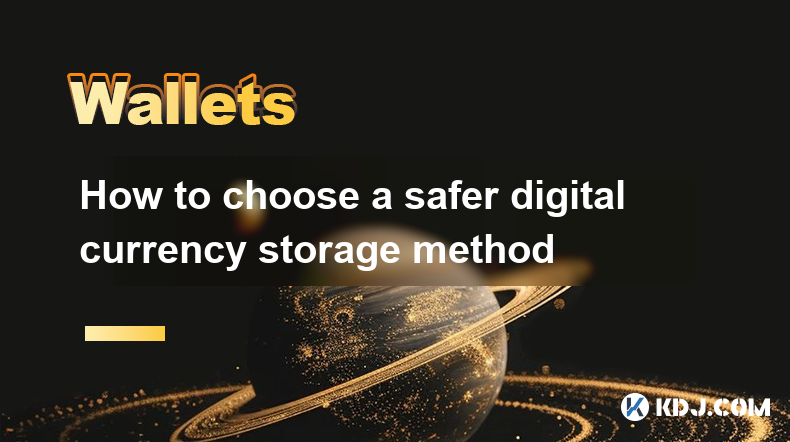
Choosing a safer digital currency storage method is crucial for protecting your cryptocurrency investments. With the rise in digital currency usage, the importance of secure storage solutions cannot be overstated. This article will explore various storage methods, their security features, and how to choose the most appropriate one for your needs. By understanding the different options available, you can make an informed decision that enhances the safety of your digital assets.
Understanding Digital Currency Storage
Digital currency storage refers to the methods used to keep your cryptocurrencies safe from theft, loss, or unauthorized access. There are several types of storage solutions available, each with its own set of security features and risks. Understanding these options is the first step in choosing a safer storage method.
Types of Digital Currency Storage
There are primarily three types of digital currency storage: hot wallets, cold wallets, and paper wallets. Each type offers different levels of security and convenience, and the choice between them depends on your specific needs and risk tolerance.
- Hot Wallets: These are connected to the internet and are typically used for frequent transactions. They are convenient but less secure than other options.
- Cold Wallets: These are offline storage solutions, offering higher security as they are not connected to the internet. They are ideal for long-term storage.
- Paper Wallets: These involve printing out your public and private keys on paper. They are highly secure if stored properly but can be cumbersome to use.
Security Features to Consider
When choosing a digital currency storage method, several security features should be considered. These features can significantly impact the safety of your cryptocurrencies.
- Encryption: Look for wallets that use strong encryption to protect your data. This is crucial for preventing unauthorized access.
- Two-Factor Authentication (2FA): This adds an extra layer of security by requiring a second form of verification before accessing your wallet.
- Backup and Recovery Options: Ensure that the storage method provides reliable backup and recovery options to prevent loss of funds due to hardware failure or other issues.
- Multi-Signature (Multi-Sig): This requires multiple signatures to authorize a transaction, adding an additional layer of security.
Hot Wallets: Pros and Cons
Hot wallets are digital wallets that are connected to the internet, making them suitable for frequent transactions. However, they come with certain risks that need to be carefully considered.
Pros:
- Convenience: Hot wallets are easy to use and allow for quick transactions.
- Accessibility: They can be accessed from anywhere with an internet connection.
- Integration: Many hot wallets integrate well with exchanges and other platforms.
Cons:
- Security Risks: Being online, hot wallets are more vulnerable to hacking and cyber attacks.
- Dependence on Third Parties: Many hot wallets are provided by third-party services, which can introduce additional risks.
Cold Wallets: Pros and Cons
Cold wallets are offline storage solutions that offer a higher level of security compared to hot wallets. They are ideal for storing large amounts of cryptocurrency that you do not need to access frequently.
Pros:
- Enhanced Security: Cold wallets are not connected to the internet, making them much less vulnerable to hacking.
- Control: You have full control over your private keys, reducing the risk of third-party interference.
- Long-Term Storage: Ideal for holding cryptocurrencies for the long term.
Cons:
- Inconvenience: Cold wallets are less convenient for frequent transactions.
- Cost: Some cold wallets, like hardware wallets, can be more expensive than their hot wallet counterparts.
Paper Wallets: Pros and Cons
Paper wallets involve printing out your public and private keys on paper. This method can be highly secure if managed properly, but it also has its drawbacks.
Pros:
- High Security: If stored in a secure location, paper wallets can be very secure.
- No Digital Footprint: Since they are offline, there is no digital footprint to trace.
- Cost-Effective: Creating a paper wallet is typically free or very low cost.
Cons:
- Vulnerability to Physical Damage: Paper wallets can be damaged by water, fire, or other physical hazards.
- Inconvenience: Using a paper wallet for transactions can be cumbersome and requires careful handling.
Choosing the Right Storage Method
Choosing the right digital currency storage method depends on several factors, including your security needs, transaction frequency, and the amount of cryptocurrency you hold. Here are some steps to help you make an informed decision:
- Assess Your Needs: Determine how often you need to access your cryptocurrencies and how much you are storing. This will help you decide between hot and cold wallets.
- Evaluate Security Features: Look for wallets with strong encryption, 2FA, and multi-sig capabilities to enhance security.
- Consider Your Technical Skills: If you are not tech-savvy, a simpler solution like a hardware wallet might be more suitable.
- Budget: Consider the cost of different storage solutions and choose one that fits your budget without compromising on security.
Best Practices for Secure Storage
Regardless of the storage method you choose, following best practices can significantly enhance the security of your digital currencies.
- Regularly Update Software: Keep your wallet software up to date to protect against known vulnerabilities.
- Use Strong Passwords: Use complex and unique passwords for your wallets and enable 2FA whenever possible.
- Backup Your Wallets: Regularly backup your wallets and store the backups in a secure, offline location.
- Educate Yourself: Stay informed about the latest security threats and best practices in the cryptocurrency space.
Case Studies: Successful and Failed Storage Methods
Examining real-world examples can provide valuable insights into the effectiveness of different storage methods.
- Successful Example: A user who stored their cryptocurrencies in a hardware wallet and regularly backed up their private keys successfully protected their assets from a major exchange hack.
- Failed Example: Another user who kept their cryptocurrencies in a hot wallet on an exchange lost their funds due to a security breach. This highlights the importance of not relying solely on exchange-based hot wallets for storage.
The Role of Exchanges in Digital Currency Storage
While exchanges offer convenient hot wallets, they should not be relied upon as the primary storage method for your cryptocurrencies. Exchanges are prime targets for hackers, and numerous high-profile breaches have resulted in significant losses for users.
- Use Exchanges for Trading: Exchanges are best used for trading and short-term storage of cryptocurrencies.
- Withdraw to Secure Wallets: After trading, withdraw your cryptocurrencies to a more secure wallet, such as a cold wallet or a hardware wallet.
- Research Exchange Security: Before using an exchange, research its security measures and history of breaches to assess its reliability.
Future Trends in Digital Currency Storage
The field of digital currency storage is constantly evolving, with new technologies and methods being developed to enhance security. Some future trends to watch include:
- Decentralized Storage Solutions: These solutions aim to reduce the risks associated with centralized storage by distributing data across multiple nodes.
- Biometric Authentication: The use of biometric data, such as fingerprints or facial recognition, to enhance wallet security.
- Quantum-Resistant Cryptography: As quantum computing poses a potential threat to current encryption methods, the development of quantum-resistant cryptography could become crucial for securing digital currencies.
Common Questions and Answers
Q: What is the difference between a hot wallet and a cold wallet?
A: A hot wallet is connected to the internet and is used for frequent transactions, offering convenience but less security. A cold wallet is offline, providing higher security and is ideal for long-term storage.
Q: Are paper wallets still a viable storage method?
A: Paper wallets can be highly secure if stored properly, but they are less convenient for transactions and vulnerable to physical damage. They are still viable for those who prioritize security and can manage them carefully.
Q: How can I enhance the security of my digital currency storage?
A: To enhance security, use strong encryption, enable two-factor authentication, regularly backup your wallets, and stay informed about the latest security threats and best practices in the cryptocurrency space.
Q: Should I store my cryptocurrencies on an exchange?
A: It is not recommended to store large amounts of cryptocurrencies on an exchange due to the risk of hacks. Use exchanges for trading and withdraw your funds to a more secure wallet for long-term storage.
Q: What should I consider when choosing a digital currency storage method?
A: Consider your security needs, transaction frequency, the amount of cryptocurrency you hold, the technical skills required, and your budget. Evaluate the security features of different storage solutions to make an informed decision.
Disclaimer:info@kdj.com
The information provided is not trading advice. kdj.com does not assume any responsibility for any investments made based on the information provided in this article. Cryptocurrencies are highly volatile and it is highly recommended that you invest with caution after thorough research!
If you believe that the content used on this website infringes your copyright, please contact us immediately (info@kdj.com) and we will delete it promptly.
- Gold Dips from Record High as Market Turmoil Sparks Profit-Taking
- 2025-04-04 08:35:12
- Factors such as whale accumulation, bullish technical indicators, and market sentiment have contributed to this optimistic outlook.
- 2025-04-04 08:35:12
- With the crypto market entering a new growth cycle in 2025
- 2025-04-04 08:30:11
- EOS Price Defies the Market Crash: +46% in a Week!
- 2025-04-04 08:30:11
- BlockDAG (BDAG) Breaks Records With 2,380% Presale Price Jump, Outpacing Dogecoin (DOGE) and Kaspa (KAS)
- 2025-04-04 08:25:12
- Economic uncertainty and a major crypto exchange hack pushed down the total value locked in DeFi protocols to $156 billion in the first quarter of 2025
- 2025-04-04 08:25:12
Related knowledge
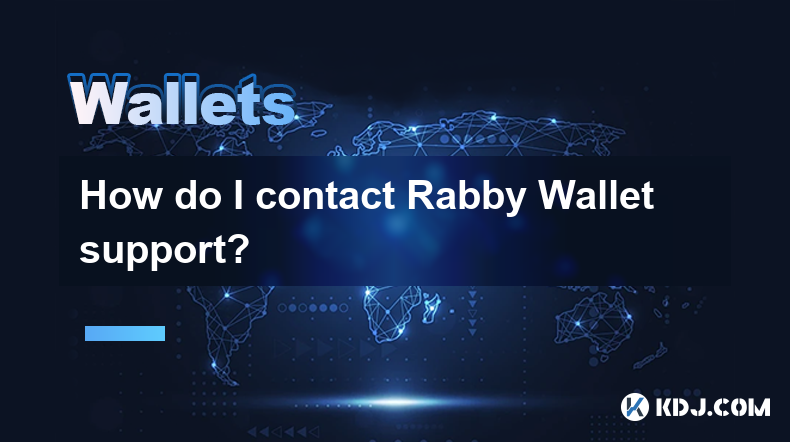
How do I contact Rabby Wallet support?
Apr 04,2025 at 08:42am
Introduction to Rabby Wallet SupportIf you are a user of Rabby Wallet and need assistance, knowing how to contact their support team is crucial. Rabby Wallet offers various methods to reach out for help, ensuring that users can get the support they need efficiently. This article will guide you through the different ways to contact Rabby Wallet support, ...
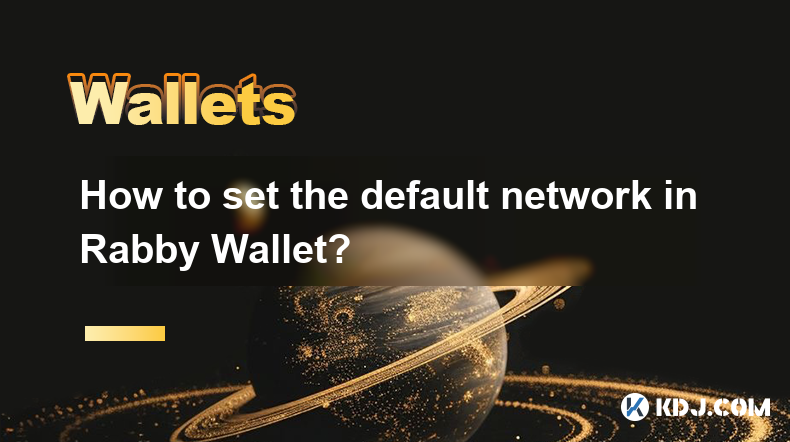
How to set the default network in Rabby Wallet?
Apr 04,2025 at 06:35am
Setting the default network in Rabby Wallet is a crucial step for users who frequently interact with different blockchain networks. This guide will walk you through the process of setting your preferred network as the default, ensuring a seamless experience when managing your cryptocurrencies. Whether you're using Ethereum, Binance Smart Chain, or any o...
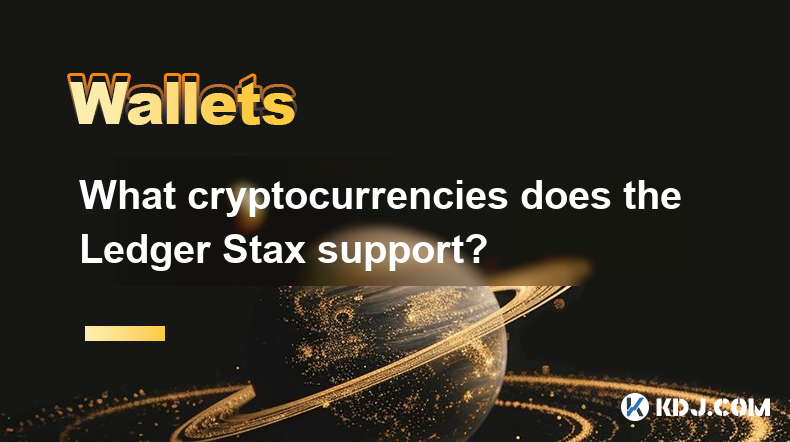
What cryptocurrencies does the Ledger Stax support?
Apr 04,2025 at 02:00am
The Ledger Stax is a highly advanced hardware wallet designed to provide secure storage for a wide range of cryptocurrencies. It is essential for users to understand which cryptocurrencies are supported by the Ledger Stax to ensure they can manage their digital assets effectively. In this article, we will explore the various cryptocurrencies that the Le...
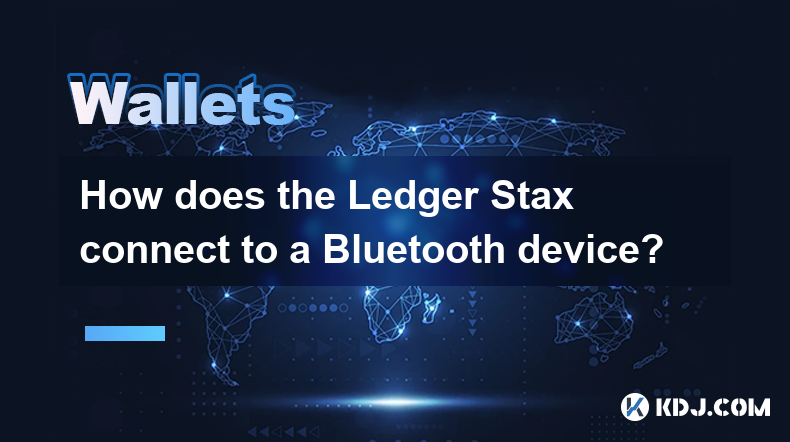
How does the Ledger Stax connect to a Bluetooth device?
Apr 03,2025 at 11:07pm
Introduction to Ledger Stax and Bluetooth ConnectivityThe Ledger Stax is a cutting-edge hardware wallet designed to provide secure storage for your cryptocurrencies. One of its key features is the ability to connect to other devices via Bluetooth, which enhances its usability and convenience. In this article, we will explore in detail how the Ledger Sta...
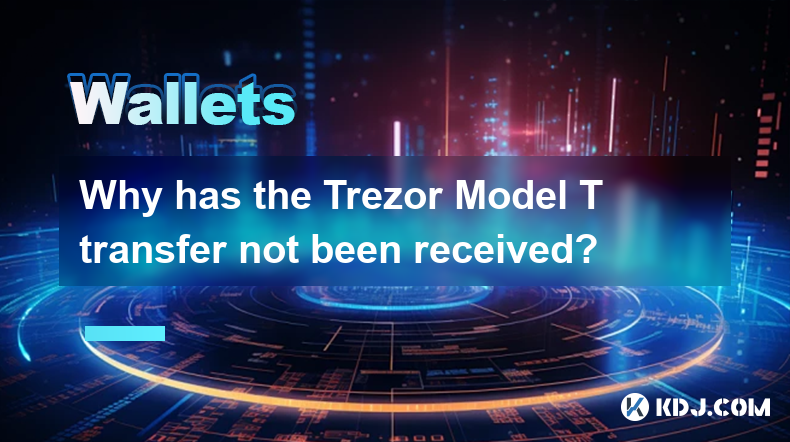
Why has the Trezor Model T transfer not been received?
Apr 04,2025 at 08:14am
Introduction to Trezor Model TThe Trezor Model T is a popular hardware wallet used by cryptocurrency enthusiasts to securely store their digital assets. It supports a wide range of cryptocurrencies and offers robust security features, including a touchscreen interface and a secure chip. However, users sometimes encounter issues with transactions, such a...
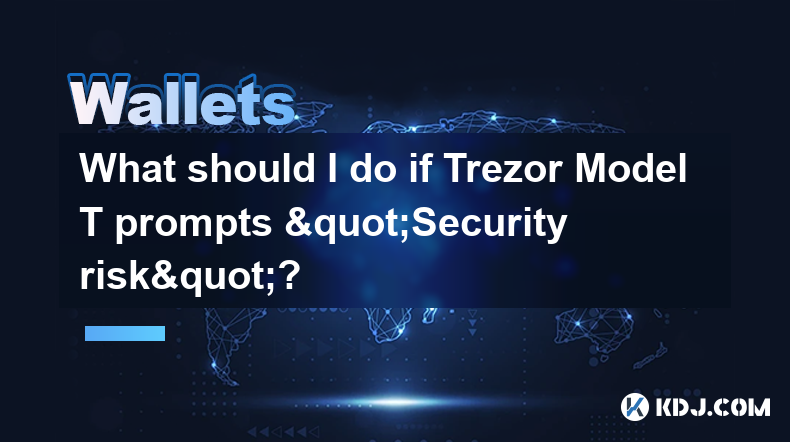
What should I do if Trezor Model T prompts "Security risk"?
Apr 04,2025 at 04:56am
If your Trezor Model T displays a 'Security risk' message, it's crucial to address this issue promptly to ensure the security of your cryptocurrency assets. This warning typically appears when there is a potential threat to your device or when the device detects unusual activity. Here's a detailed guide on how to handle this situation. Understanding the...

How do I contact Rabby Wallet support?
Apr 04,2025 at 08:42am
Introduction to Rabby Wallet SupportIf you are a user of Rabby Wallet and need assistance, knowing how to contact their support team is crucial. Rabby Wallet offers various methods to reach out for help, ensuring that users can get the support they need efficiently. This article will guide you through the different ways to contact Rabby Wallet support, ...

How to set the default network in Rabby Wallet?
Apr 04,2025 at 06:35am
Setting the default network in Rabby Wallet is a crucial step for users who frequently interact with different blockchain networks. This guide will walk you through the process of setting your preferred network as the default, ensuring a seamless experience when managing your cryptocurrencies. Whether you're using Ethereum, Binance Smart Chain, or any o...

What cryptocurrencies does the Ledger Stax support?
Apr 04,2025 at 02:00am
The Ledger Stax is a highly advanced hardware wallet designed to provide secure storage for a wide range of cryptocurrencies. It is essential for users to understand which cryptocurrencies are supported by the Ledger Stax to ensure they can manage their digital assets effectively. In this article, we will explore the various cryptocurrencies that the Le...

How does the Ledger Stax connect to a Bluetooth device?
Apr 03,2025 at 11:07pm
Introduction to Ledger Stax and Bluetooth ConnectivityThe Ledger Stax is a cutting-edge hardware wallet designed to provide secure storage for your cryptocurrencies. One of its key features is the ability to connect to other devices via Bluetooth, which enhances its usability and convenience. In this article, we will explore in detail how the Ledger Sta...

Why has the Trezor Model T transfer not been received?
Apr 04,2025 at 08:14am
Introduction to Trezor Model TThe Trezor Model T is a popular hardware wallet used by cryptocurrency enthusiasts to securely store their digital assets. It supports a wide range of cryptocurrencies and offers robust security features, including a touchscreen interface and a secure chip. However, users sometimes encounter issues with transactions, such a...

What should I do if Trezor Model T prompts "Security risk"?
Apr 04,2025 at 04:56am
If your Trezor Model T displays a 'Security risk' message, it's crucial to address this issue promptly to ensure the security of your cryptocurrency assets. This warning typically appears when there is a potential threat to your device or when the device detects unusual activity. Here's a detailed guide on how to handle this situation. Understanding the...
See all articles






















































































